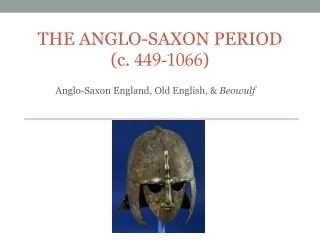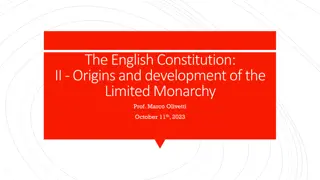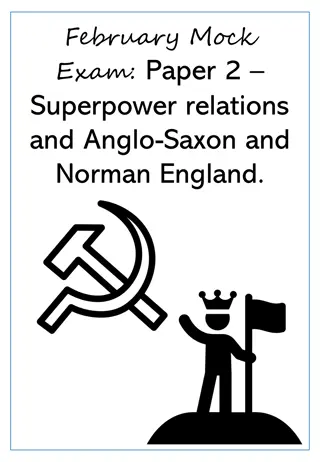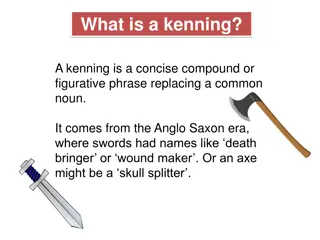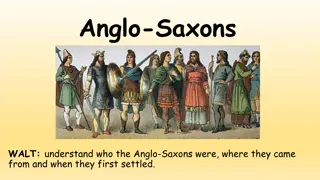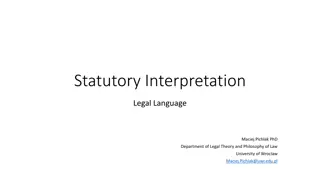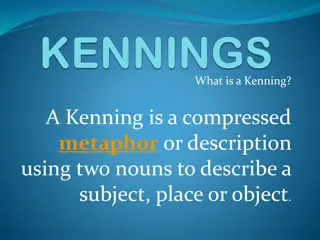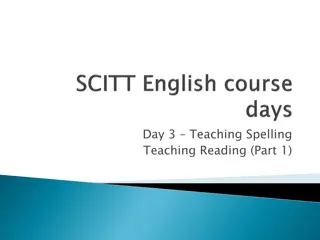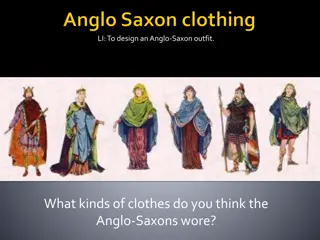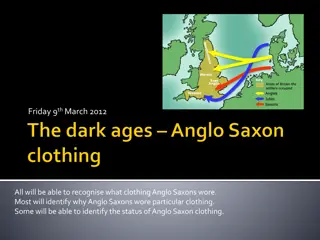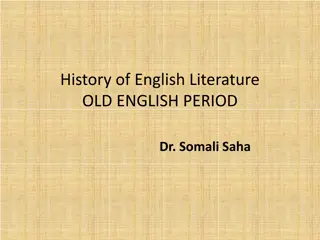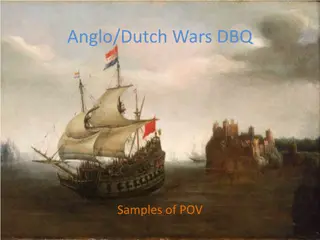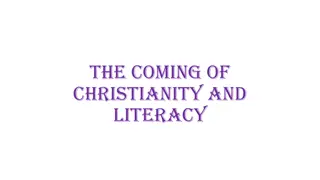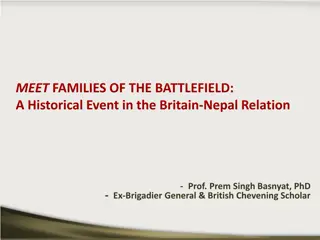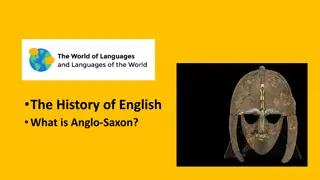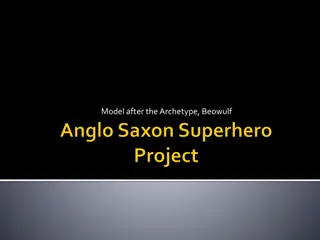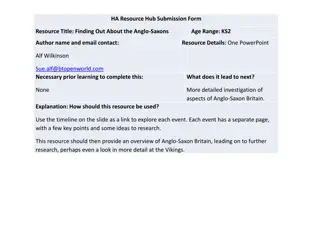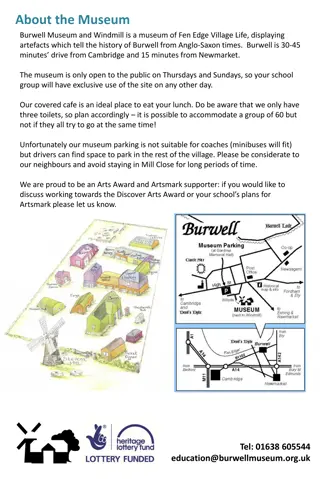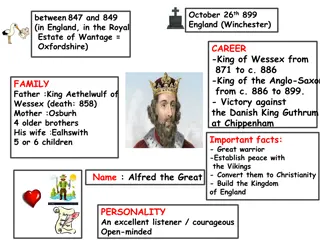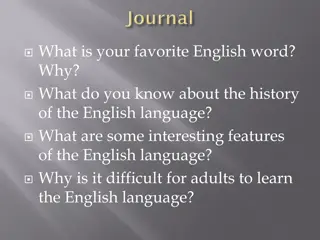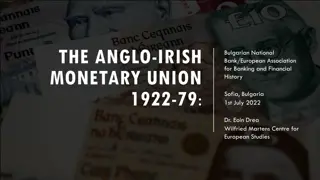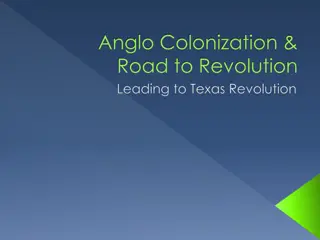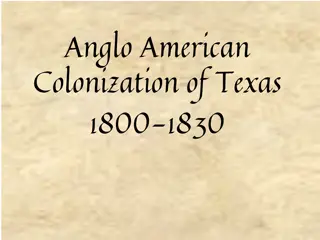The Anglo-Saxon Period: Migration and Integration in Angleland
The Anglo-Saxon period (c. 449-1066) in England saw a dynamic interplay of various cultures, including the Celts, Romans, and Germanic tribes. The arrival of Angles, Saxons, Jutes, and others led to the formation of Angleland (England), with societal structures based on heroic ideals like courage an
3 views • 20 slides
Evolution of Limited Monarchy in English Constitution
The development of limited monarchy in the English Constitution is traced from Anglo-Saxon Britain through the introduction of feudalism. This system of governance established a complex relationship between the king, lords, and vassals, leading to the formation of the King's Council and the origins
0 views • 19 slides
Language Study Community – Enhance Your Language Skills
Joining a Language Study Group is a fantastic way to take your language learning to the next level. By leveraging the power of Group Study, you can immerse yourself in the language, enhance your understanding, and build confidence in your speaking abilities. Read full article \/\/explainlearning.com
1 views • 3 slides
Anglo-Maratha Wars: A Historical Overview
The Anglo-Maratha Wars were a series of conflicts between the British East India Company and the Maratha Empire in India, spanning three wars from 1775 to 1818. The wars resulted in significant territorial changes and power shifts in the region, shaping the history of India during that period.
0 views • 10 slides
Academic Language Demands and Supports in Instructional Planning
Academic Language Demands and Supports are crucial in educational settings to ensure comprehension and usage of language by students. This content discusses embedding language demands in lesson plans, providing language supports, and peer review activities to enhance academic language skills. The fo
6 views • 10 slides
The Significance of Media in Language Learning
Media plays a crucial role in language learning by raising awareness of the ideology behind linguistic structures and providing valuable information on society and culture. Linguists are drawn to media language for research purposes and to understand its impact on language use and attitudes. Media s
12 views • 5 slides
Understanding Translation: Key Concepts and Definitions
Translation involves transferring written text from one language to another, while interpreting deals with oral communication. Etymologically, the term "translation" comes from Latin meaning "to carry over." It is a process of replacing an original text with another in a different language. Translat
12 views • 76 slides
The Etymology of Modern English Vocabulary: A Detailed Analysis
The etymology of modern English vocabulary explores words of native Anglo-Saxon origin, Germanic borrowings, and English elements, examining their characteristics and assimilation into the language. It delves into the ways borrowing occurs, criteria for assimilation, and the distinct layers comprisi
8 views • 15 slides
Anglo-Saxon, Norman England, and Superpower Relations Study Plan
Year 11 homework schedule and revision plan covering topics such as Anglo-Saxon and Norman England, Superpower Relations, Cold War events, and key historical figures. Resources include BBC Bitesize, Seneca, and GCSEPod for comprehensive study material and quizzes.
0 views • 12 slides
Life as an Anglo-Saxon Child - Insights and Imaginations
Delve into the world of Anglo-Saxon children through reflections, images, and challenges. Explore the daily life, chores, education, and pastimes through a creative diary entry challenge. Unveil the intricacies of their upbringing in an engaging and informative journey into the past.
5 views • 13 slides
Creating an Anglo-Saxon House Drawing: A Step-by-Step Guide
Explore the world of Anglo-Saxon houses through a series of activities designed to help you draw your own representation. Follow instructional videos and resources to learn various techniques like drawing 3D shapes, using vanishing points for perspective, and shading to depict different building mat
0 views • 7 slides
Kennings for Granddad - A Poetic Tribute in Anglo-Saxon Style
Dive into the ancient art of kennings with a playful tribute to Granddad, creatively capturing his everyday actions with descriptive phrases like "armchair hogger" and "history homework helper." Explore the imaginative world of figurative language reminiscent of the Anglo-Saxon era in this unique po
0 views • 4 slides
Origins and Migration of the Anglo-Saxons
The Anglo-Saxons originated from Denmark, Germany, and the Netherlands, arriving in England via wooden boats to establish themselves as warrior-farmers. This invasion led to the Angles and Saxons dominating and merging into the Anglo-Saxons, who settled in Britain for reasons such as conquest, farmi
0 views • 8 slides
Crime and Punishment in Anglo-Saxon Times
Life in Anglo-Saxon Britain (410-1066CE) involved small village living, limited urbanization, community policing, and unique forms of justice like trials by ordeal and weregild fines for crimes. The system was decentralized, with neighbors and tithings responsible for law enforcement and punishment
0 views • 8 slides
Enhancing Language Learning Across the Curriculum in B.Ed. 1st Year Course
Language Across the Curriculum (LAC) emphasizes that language learning should occur across all subjects, not just in language classrooms. It highlights the importance of incorporating language development into every learning activity, fostering multilingualism in schools. Language plays a crucial ro
2 views • 34 slides
Understanding Statutory Interpretation in Legal Context
Explore the intricacies of statutory interpretation, linguistic and non-linguistic methods, and types of interpretation in legal contexts. Uncover the significance of legal reasoning, historical perspectives, and comparisons between Anglo-Saxon and Continental legal cultures. Delve into the complexi
1 views • 17 slides
Speech and Language Developmental Milestones: A Bilingual/Multilingual Perspective
Speech and language developmental milestones are crucial for children, regardless of their home language. These milestones encompass receptive language, expressive language, pragmatics, and articulation and phonology. Understanding how a child hears and talks from birth to one year is essential, as
1 views • 23 slides
Understanding Kennings in Poetry: Examples and Significance
Kennings are compressed metaphors using two nouns to describe a subject, popular in Anglo-Saxon poetry like Beowulf. They add depth and imagery, with examples like "sky-climber" for a mountain. Explore how kennings enhance poetic expression and try creating modern kennings.
1 views • 5 slides
Exploring Effective Phonics Teaching and Spelling Conventions through History
Explore the development of effective phonics teaching and spelling conventions through reflective logs and historical context. Discover the impact of phonics sessions on understanding and teaching practices, delving into Old English to modern-day practices. Learn about the evolution of language and
0 views • 57 slides
Anglo-Saxon Clothing: Design and Comparison with Modern Attire
Explore the clothing worn by Anglo-Saxons, including details on men's and women's outfits, accessories, and footwear. Learn about the similarities and differences between Anglo-Saxon attire and modern clothing styles. Get inspired to design an everyday outfit following Anglo-Saxon fashion, with a fu
0 views • 6 slides
Discovering Anglo-Saxon Clothing: Materials and Styles
Explore the clothing worn by Anglo-Saxons, including materials like wool and natural fibers, and different styles for men and women. Learn about tunics, dresses, leggings, brooches, and more. Get creative by designing your own Anglo-Saxon outfit for a party using the inspiration from historical imag
0 views • 9 slides
Overview of Anglo-Saxon Literature in Old English Period
The Old English period in English literature, dominated by the Anglo-Saxons, showcased a rich tapestry of poetic works, notable authors, and distinct dialects. Key literary features include pagan and Christian elements, as seen in epic poems like Beowulf and Caedmonian Poems. Additionally, the perio
0 views • 11 slides
Perspectives on Anglo-Dutch Wars: Documents and Views
Documents from English ambassador Sir George Downing and an anonymous pamphlet published in the Dutch Republic offer contrasting perspectives on the financial burdens and priorities during the Anglo-Dutch Wars. Sir Downing highlights the financial strain on the Dutch provinces, specifically Holland,
0 views • 26 slides
The Impact of Christianity and Literacy on Anglo-Saxon England
The arrival of Christianity in Anglo-Saxon England by missionaries led by St. Augustine brought about significant cultural and linguistic changes, including the introduction of literacy and the Roman alphabet. This transformation facilitated the spread of European culture, influencing the adoption o
0 views • 14 slides
Exploring Sociolinguistics: Language Variation and Social Factors
Sociolinguistics delves into the study of language variation influenced by social factors, examining the relationship between language and its social context. It explores various aspects like standard pronunciation, language choice, speech acts, language components, language variety, and factors suc
0 views • 73 slides
Anglo-Nepal Relations: A Historical Perspective
Explore the historical events in the relationship between Britain and Nepal through the lens of Prof. Prem Singh Basnyat, tracing back to the beginnings of Anglo-Nepal physical relations and the Anglo-Nepal War. Discover the dynamics of power, conquest, and diplomacy that shaped the interactions bet
0 views • 33 slides
The Influence of Anglo-Saxon Language on Modern English
Explore the roots of Modern English in the Anglo-Saxon period, where Germanic tribes like the Angles, Saxons, and Jutes shaped the language, culture, and politics of the British Isles over 600 years. Discover how Old English, though different from present-day English, still influences a significant
1 views • 12 slides
Understanding Assembly Language Programming for Computing Layers
Assembly language is a low-level programming language that enables direct interaction with a computer's hardware components. This content explores the fundamentals of assembly language, the relationship between human-readable machine language and binary code, an assembly language program for multipl
0 views • 31 slides
Creating a Beowulf-Inspired Superhero for Marvel Comics
Hired by Marvel Comics, you are tasked with developing a new superhero embodying the qualities of Beowulf. This project involves designing a brave, kind, protective, and honest character with superhuman abilities and a flaw, set in an Anglo-Saxon inspired society that values bravery, honesty, and co
0 views • 12 slides
Connections, Succession, and Trade: Insights into Anglo-Saxon England
Anglo-Saxon England in 1066 was a centralized, efficient kingdom vulnerable to invasion. Professor Stephen Baxter discusses the attractive nature of the society to invaders due to its centralization and wealth. The family tree of the Kings of England reveals intricate connections, successions, and a
0 views • 9 slides
Understanding Kenning Poems: An Exploration of Old Norse Tradition
Kenning poems are like riddles that describe something without explicitly stating it. This poetic form originated from Old Norse tradition, bringing elements of Anglo-Saxon and Norse cultures into our language. Kennings feature two-word phrases joined by a hyphen, typically composed of a noun and a
0 views • 13 slides
Understanding Language Anxiety in Foreign Language Learning and Teaching
Explore the impact of language anxiety on students and teachers in foreign language learning and teaching contexts through insights from Dr. Christina Gkonou's research. Delve into the theoretical background, implications for language education, and real-life experiences shared at the Essex Language
0 views • 25 slides
Unlocking the World of Anglo-Saxons through Interactive Exploration
Delve into the fascinating realm of Anglo-Saxon England using this interactive PowerPoint resource. Explore key events, ask thought-provoking questions, and access valuable online resources to deepen your understanding. Ideal for KS2 students seeking to uncover the mysteries of this historical perio
0 views • 25 slides
Explore Burwell Museum and Windmill: Educational Visits and Workshops
Discover the Burwell Museum and Windmill in Cambridgeshire, offering educational visits and workshops focusing on local history, STEM activities, and immersive experiences. From Anglo-Saxon artifacts to WW2 evacuee simulations, the museum provides a hands-on learning environment for school groups. P
0 views • 4 slides
Biography of Alfred the Great: King of Wessex and Anglo-Saxon
Alfred the Great, born in England in 847, was a renowned warrior and peacemaker who ruled both Wessex and Anglo-Saxon territories. He achieved a significant victory against the Danish King Guthrum and was known for establishing peace with the Vikings, converting them to Christianity, and strengtheni
0 views • 4 slides
Evolution of the English Language: From Celts to Anglo-Saxons
The English language has evolved from the ancient Celts through the Roman Empire and Anglo-Saxon invasions. Influences from Latin, Greek, and Germanic languages have shaped modern English. Explore the history and cultural impacts of these civilizations on the development of the English language.
0 views • 21 slides
Evolution of Irish Monetary Policy 1922-79: Economic Realities and Policy Approach
The Anglo-Irish Monetary Union saw Ireland navigate economic challenges and dependency on the UK from 1922-79. The incremental approach to currency and banking policy, along with the establishment of the Central Bank of Ireland, shaped the country's financial landscape. Key milestones included the A
0 views • 12 slides
From Anglo Colonization to Texas Revolution: A Journey Westward
Anglo Colonization and the road to revolution led to the Texas Revolution as American settlers moved west, disregarding Spanish authority and sparking conflicts. Empresarios played a role in land distribution, while figures like Augustus Magee and Bernardo Gutierrez fought for Texas independence. Tr
0 views • 18 slides
Anglo-American Colonization of Texas: Settlement and Control by Spain
Anglo-Americans began moving westward after the United States gained independence, leading to an increased interest in Texas due to its abundant land and opportunities. However, Spain sought to control American immigration by offering land grants with conditions such as pledging loyalty and converti
0 views • 34 slides
Exploring Iconography and Metal-Smithing Techniques of the Anglo-Saxon Era
Delve into the rich symbolism and cultural connections of the Anglo-Saxon period through images and descriptions of Saxon wolf symbolism, Staffordshire sword seax hilt, Suffolk bracteate, Roman and Saxon iconography mix, Celtic connections, and Celtic wolf motifs. Discover the intricate details of h
0 views • 16 slides
